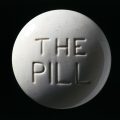No sooner had we landed than my phone began to convulse with a cacophony of bells and chimes. Most of the notifications were last minute details about the live broadcast that brought me to town. In one voice message, a coworker informed me that the producer cancelled our pre-production dinner meeting because of her migraines. He added, “When she eats certain breads, it triggers her headaches.”
This happened early in my research on hormonal contraceptives, but I had read enough to know that birth control could cause migraines, and women with migraines were at a higher risk for strokes. I also knew that doctors at the Nelson Pill Hearings testified that birth control pills affect the way a woman’s body metabolizes carbohydrates in myriad ways. I had no idea what the mechanism of action could be, but at that moment I would have bet my children’s milk money that our producer was on hormonal birth control, and I intended to ask her about it.
This was my client’s client. I wondered if it was safe to broach the subject of birth control with her, but I knew the answer before I could even fully form the question in my head. I wouldn’t be able to forgive myself if she ever had a stroke, and I hadn’t warned her.
The next morning she felt better and showed up for the load-in. When no one else was around, I asked some questions about her headaches, ending with, “I’m curious, did you start getting migraines after you began birth control?”
When you ask a question like that, you know there’s a better than zero chance the reaction could be negative. Thankfully, not even a glimmer of disapproval flashed in her eyes as she replied, “Oh no, I took The Pill for a long time before I had my first migraine.”
I said, “That’s still after you started.”
She laughed it off as a silly question. However, after sleeping on it, she approached me the next morning, “You know, you may be onto something. I hadn’t thought about it, but my migraine symptoms did get a lot worse when I switched birth control brands.”
Connect the Dots: Birth Control and Migraines
The correlation between birth control and migraines has been known for decades, as has their connection to an increased risk of stroke. However, two hurdles probably play a key role in preventing patients and their physicians from making the connection in the real world today – those being familiarity and latency.
Many side effects of hormonal birth control occur as extremely common ailments, such as breast cancer, strokes, and migraines. Not coincidentally, they’ve grown even more common in direct correlation to the introduction and prevalence of hormonal contraceptives. Paradoxically, they’ve become so familiar and so unremarkable that doctors rarely look for the primary culprit that causes the migraines. Essentially, they can’t see the tree for the forest.
Some side effects, such as migraines or depression, can happen almost instantaneously. (Even so, doctors frequently miss the connection.) However, it usually takes some time for the symptoms to precipitate. This latency can hinder even the most astute physician from considering hormonal contraceptives as the likely cause of problems. I’m being generous in my phrasing. In reality, I can’t help but wonder what role fear of litigation plays in this ‘blindness.’
Ultimately, why they overlook the correlation to birth control is less important than the consequences it creates, which include dramatic under-reporting of complications. In 1970 while discussing strokes at the Nelson Pill Hearings, Senator Gaylord Nelson expressed this prescient concern:
Every time the issue has been discussed here concerning the increased incidence of this disorder or that disorder, they always end up saying, “but the statistical sample is so small that there is room for error, and we can only make sort of an educated guess.”… I am just concerned with the fact that the reporting of these side effects and their effect on the cause of death may not be related to the pill at all. (Monopoly Subcommittee, page 6419)
Dr. Herbert Ratner added his perspective (Monopoly Subcommittee, page 6743), “For the first time in medicine’s history, the drug industry has placed at our disposal a powerful, disease-producing chemical for use in the healthy rather than the sick.” [my emphasis] Yet, forty-five years later, we still have no national registry, no way of tracking patients on birth control so that scientists can conduct comprehensive etiological studies that would connect the dots and precisely reveal the consequences of hormonal contraceptives. In fact, our healthcare reporting system is so fractured we can’t even put our finger on an accurate estimate of how many women take hormonal birth control. Estimates from trusted sources range from 11 million to 18 million.
The Pill, Migraines, and Strokes
The University of Virginia student health services published a document on their website outlining the definitive link between migraines and strokes. Beyond warning that the “increased risk of stroke is amplified by the use of estrogen-containing birth control methods,” the doctors who prepared the document boldly state,
it is strongly recommended that women with a personal or family history of migraine headaches should select non-estrogen methods of contraception. [Their emphasis]
This information should be part of every ‘informed consent’ conversation before a doctor writes the first birth control script. Not to mention the many other complications that need to be discussed. This kind of warning should be the norm. Unfortunately, it’s the exception.
Strokes Redefined
It took only three generations of users for hormonal contraceptives to redefine our perception of strokes. A young women starting on The Pill today may not even realize that when her great grandmother began birth control, strokes were considered an old person’s disease.
But, strokes aren’t just for grandparents anymore. A recent article in the Washington Post leads off with this troubling statement about strokes in young people:
In a study released Wednesday in the Journal of the American Heart Association, researchers found that between 2000 and 2010, hospitalizations for ischemic stroke, the most common type, dropped nearly 20 percent overall – but among people ages 25 to 44, there was a sharp 44 percent increase in the rate.
There are a couple of other interesting facts later in the article – or rather, one interesting fact, and another made interesting by its glaring omission. The first comes from a description of the study:
The data analyzed includes information on 8 million hospital stays and came from the Nationwide Inpatient Sample, the largest publicly available database in the United States on these patients.
In stressing the importance of a large database, the author underscores the necessity for a national registry to track patients so that important lines can be drawn. Of course, the second part is that the lines actually need to be drawn. Amazingly, here’s what the Post article says about what might have contributed to the increase:
Doctors attribute the apparent rise in strokes among younger adults to the same lifestyle risk factors traditionally found in older patients, such as obesity, diabetes and high blood pressure.
It isn’t until much later in the article that they include:
Each year significantly more women die from stroke than from breast cancer — and yet many women think of stroke as a man’s disease. According to a 2015 national survey, only 11 percent of the 1000 women surveyed could identify female-specific stroke risk factors, like migraine headaches with aura, hormone-replacement therapy, oral contraception and pregnancy, particularly in the final month and postpartum.
Talk about burying the lede. Maybe women would stand a better chance of identifying these factors if journalists dared include them in the “lifestyle risk factors” mentioned previously.
Testimony Without Equivocation
The science linking birth control pills to strokes hasn’t changed. As far as I can tell, no one has disputed the correlation since The Lancet first published Dr. Victor Wynn’s study in 1966.
Pay attention to this excerpt from Dr. Alan Guttmacher’s testimony at the Nelson Pill Hearings. Dr. Guttmacher was the founding president of Planned Parenthood/World Population, and was arguably the staunchest proponent of The Pill ever to live:
We know the facts about thromboembolism. I think this is pretty uncontested. We know the facts about development of high blood pressure in a certain small proportion of patients. We know the fact that certain patients get depressed on the pill. These are the facts we are all privy to. (Monopoly Subcommittee, page 6615)
Earlier in the hearings, Dr. J. Edwin Wood explained the phenomenon that caused healthy young women to develop strokes:
One of the major contributing causes of thrombosis in veins appears to be that of reduced velocity of flow of blood in the veins or relative stagnation or stasis of flow in the veins…
Studies of women taking oral contraceptive agents have led to the clear-cut finding of dilatation of the veins of the extremities – other veins as well perhaps but they have not been studied. These dilated veins carry the same amount of blood as before but since they are wider in diameter the blood flows more slowly.
The net effect of this series of events is a slowing of the blood flow during oral contraceptive therapy. This finding is distinctly abnormal and is not observed in any other circumstance in young women except during pregnancy or in the presence of varicose veins. (Monopoly Subcommittee, page 6157-6158)
The facts about hormonal contraceptives and strokes were well known in 1970, yet they somehow seem to have escaped the curriculum in today’s medical schools. It may be uncomfortable but if you know a woman who suffers migraines, don’t hesitate to ask her if she’s on hormonal contraceptives. Then, please share the facts about migraines and birth control.
[atkp_product id=’48881′ template=’bestseller’][/atkp_product]
We Need Your Help
More people than ever are reading Hormones Matter, a testament to the need for independent voices in health and medicine. We are not funded and accept limited advertising. Unlike many health sites, we don’t force you to purchase a subscription. We believe health information should be open to all. If you read Hormones Matter, like it, please help support it. Contribute now.
Yes, I would like to support Hormones Matter.
This article was first published on November 21, 2016.












